I recently had the great honor of being selected as one of eight youth bloggers to report on the 66th UN Department of Public Information/NGO Education for Global Citizenship
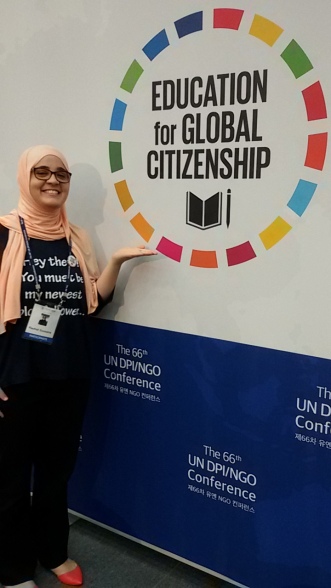
conference, which was hosted in Gyeongju, South Korea from May 30th to June 1st. During these three days, I met many different people and I learned a lot about what global citizenship meant to them and what they wanted the future to look like. I was also fortunate enough to participate in the development of the Gyeongju Action Plan, which will provide guidance to NGOs around the world who are lobbying their governments and civil societies to commit to the implementation of the Sustainable Development Goals (SDGs). After attending various workshops and engaging in many fascinating conversations about global citizenship and the SDGs, I came to the following 4 conclusions.
1) Developmental goals need to be achieved through a common framework
Quite frankly, I’ve never been a huge fan of the idea of “re-inventing the wheel,” because I think there is so much that could be done with the “wheel” we already have. This is especially true when it comes to the development world. Since the turn of the century, the UN has ratified two main global development frameworks for countries to organize and harmonize their long-term development strategies. The first framework was launched in 2000 in the form of the Millennial Development Goals, which were supposed to be achieved by 2015. After reviewing and analyzing the successes and shortcomings of the MDGs, the UN introduced the SDGs to the world in September 2015, which are officially known as the 2030 Agenda for Sustainable Development. So what are the SDGs? There are 17 goals and they are as follows…
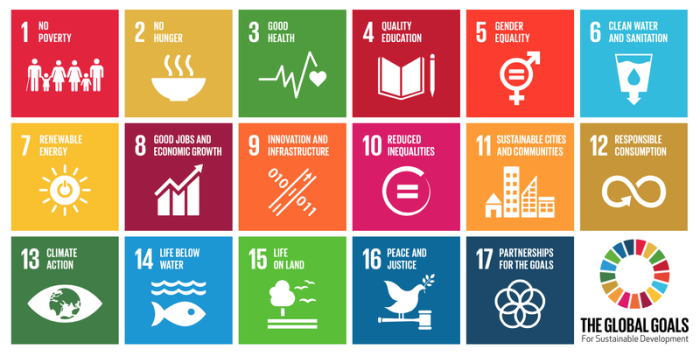
Why is it beneficial for governments, civil societies, NGOs and social influencers to use a common development framework? Firstly, it allows the stakeholders in national and international development ecosystems to work together and channel all of their resources and expertise towards achieving specific joint goals. Secondly, it also allows the various development stakeholders to share their knowledge and experience. Thus, creating a common knowledge core of best practices that can be tweaked and implemented in an iterative process to meet the needs of the populations they are serving. Lastly, the exhaustive and inter-connected nature of the SDGs encourages development stakeholders to approach the complex problems of our time with more multidimensional strategies. It is our responsibility as a global community to work together to make these 17 goals a to-do list not a wish list over the next 15 years.
2) Global citizenship empowers both individuals and nations
Many fear the idea of global citizenship, because they feel that it will dilute or undermine national identities. For me, this fear is fundamentally irrational, because it implies that people are unable to have multiple identities, which is simply not true. At any one moment, I can be an Arab, American, woman, Muslim, daughter, friend, writer, sister, cousin, niece etc and none of my identities can mute or eliminate each other, unless I allow them to. And the same goes for my national and global identities. In fact, if anything, I believe that global citizenship is the key to bolstering nationalism, because it encourages people to positively represent their country and engage in innovative problem-solving with fellow citizens to further their nation’s development on a national and global platform. Thus promoting collaboration, community building and civic responsibility on both a national and international level.
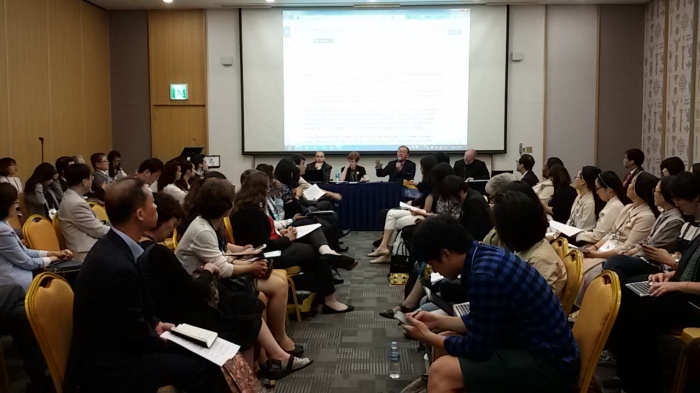
So how can we as a global community possibly encourage the dilution of national identities, when for so many it serves as a stepping stone to global citizenship? Simply put, people who have no pride or vested interest in their own countries can’t be expected to solve national problems, let alone international ones! And for the growing population of people like me, who come from mixed backgrounds and have lived all around the world, global citizenship allows us to use our “cultural fluidity” to empower the various nations, peoples and cultures that have come together to make us who we are. So, by inculcating a strong understanding of national issues and a robust culture of national and international civic participation in our youth, we can begin to deconstruct the unfair global socio-economic structures that have long polarized the world into the rich North and the poor South and rebuild them through the SDG framework.
3) Our youth are ready to be heard and included
Throughout the conference, I couldn’t help but feel awe for my fellow UN youth delegates, who worked tirelessly, day in and day out, to make sure that our voices were heard. Not only did this conference have the highest turnout of youth of any UN DPI/NGO conference ever hosted before, the youth delegates also set an important precedent by developing and issuing the first Youth Declaration ever issued in this conference’s history. Something that we are very proud of. Each one of us represented different languages, ages, cultures, and beliefs, but instead of allowing that to divide us, we made it unite us to make a stronger team, who put out a powerful document that reflects the aspirations of many young and passionate millennials around the globe. Now, more than ever, I am confident that our youth are capable of dealing with the complex problems that our countries are facing in the 21st century.
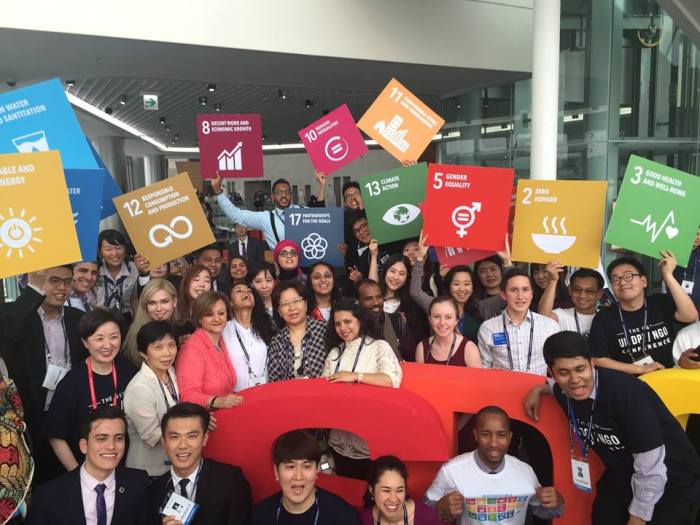
The internet and social media have fundamentally changed the way that young people access information and communicate, respectively, which has heralded a new age of international cooperation that has never been seen before. So, when a natural disaster occurs in another part of the world, I can’t be an emotional bystander anymore because of globalization. I can’t say that it doesn’t concern me anymore, because I probably have a family member or a friend who is being affected by the disaster directly or indirectly. These relationships are the very thing that make me a better global citizen, because they remind me of our common humanity and why I need to fight for better living situations for everyone. No matter where they live, what they do or what they believe. Today, I urge more government institutions, civil societies and NGOs to include more youth in their ranks, because we’re not just interested in improving OUR world, we are determined to improve THE world.
4) More “development space” needs to be created globally
We can no longer as nations live in a perpetual state of competition, because the future of our children is interdependent and ignoring that for nationalistic pride isn’t going to change anything. Since our future as global communities is intertwined, it is our collective responsibility to establish and expand “development spaces” for civil societies, NGOs and youth to connect, communicate and collaborate, so they can become powerful agents of change without the fear of imprisonment or retribution. As I mentioned before, the internet and social media have already enabled millions of people around the world to connect and promote positive change. However, the continued expansion of “development spaces” globally will rely on NGOs, civil societies and international development organizations establishing strong partnerships with governments, academia and local social influencers to ensure the expansion of healthy development ecosystems that empower national and regional populations.
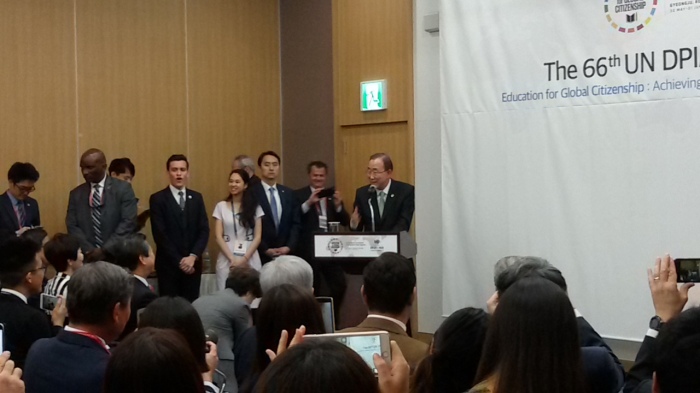
By making national and international actors responsible for the co-creation of “development spaces,” not only can the development community benefit from the exchange of country-specific knowledge and best practices. They can also develop a “self-correcting” development ecosystem, where stakeholders can curb activity from other stakeholders, who are trying to dominate or eliminate the “development space.” While the issue of national sovereignty can’t be ignored in this conversation, it is also important to realize that globalization has completely changed the notion of national sovereignty. Social media, international travel, cyber hacking, conflict etc aren’t only transforming how people interact with the world, they’re also transforming what the world looks like in our very own backyard. With that in mind, I believe it is necessary for nations to be open to working with various national and international stakeholders in the development ecosystem, so they can develop comprehensive strategies that ensure the stability and growth of their governments and people.
In conclusion….
At the conference’s opening ceremony, UN Secretary General Ban Ki Moon said that when it comes to development you can’t have passion without compassion, because both the former and the latter are needed to drive the development process to make it a sustainable one. So visit the 2030 Agenda page now and find out how you can become an agent of sustainable change today!
Like what you see? Join the Soukie Speaks email list and follow my Twitter, Instagram, Facebook accounts, so we can enlighten, support and empower the Arab leaders and entrepreneurs of the future together.
Interesting insight into SDG’s and concept of global citizenship and culture. The UK is confronting similar questions over national identity as voters go to the polls to decide to ‘remain’ or ‘leave’ the EU.
With orgs like the UN, EU, G6,G7, NATO etc it does seem as if nation states cannot decide the future of their peoples to the same extent as 20th century. Even in terms of food and water security, or the movement of refugees, many nation states have to co-operate with others. Then as you point out, so many of us have to move around globally to secure opportunities and that interaction shapes us, as does the border-less communication we all employ on the internet. Economically competition between states has massive implications in terms of energy resources, border controls and legal barriers to free movement and trade. Its increasingly feels burdensome and possibly morally unjustified.
I’m not sure what room the future leaves for the nation state or national identification. It’s a very sensitive discussion in the UK, and almost sacred in parts of the Arab World and Asia. I’m pretty sure if the UK as a nation state disappeared tomorrow, I would still be very culturally British. Longer-term how those cultural differences could be sustained, I don’t know.
We used to talk about ‘One world of a 1000 cultures’ in Jordan. The fact the UN process is talking about diversity and not homogenization is encouraging. The UN Alliance of Civilizations in Qatar had similar themes.
The one thing the post possibly leaves out is inequality; for many feeling a sense of ‘global belonging’ applies only to the privileged, and has no direct relevance to their everyday lives. It feels distant. It could be that economic insecurity and poverty, rather than borders and national identity or even culture, is the main thing holding back an economic and global commons. Digital access might play a big role too. What are the practical benefits of Global Citizenship for a refugee, or an immigrant in Europe? I’m not sure, but the question can only grow in importance.
Nice post. 😀
LikeLike
Thank you John for your very thoughtful comment. I think that national identities will always play some role in the way we define ourselves, because we are all born and live within a set of borders at some point. What I think is changing is our ability to connect, adapt and assimilate into other global identities, cultures and ideals. I have lived all around the world, but I still have very strong affinities for the nations of my parents. The amazing thing about global citizenship is that it allows us to “belong” to many countries. So, I can care about many countries and peoples, not just my own. In fact it is this very sentiment that will make our world safer, because it encourages us to view the threats of our time as common ones, thus pushing us to work together to solve them.
As for your comment regarding inequality, you are absolutely right. People who are in constant survival mode don’t care about culture or identity. Development is a process and it the responsibility of national, international and civil society organizations to help under-served communities transition from survival mode to thriving mode. As you said, unfortunately, access to information is something that is associated with those who are privileged. However, I believe that if we educate our global youth, who have access to this knowledge, and teach them how to share it with those who don’t that we can create strong informational pipelines that promote inter and intra-generational and cultural collaboration, empowerment and development.
LikeLike
* Throughout the conference, I couldn’t help but feel awe for my fellow UN youth delegates, who worked tirelessly, day in and day out, to make sure that our voices were heard.
I agree! I was totally impressed that on Day 2 morning we held a Town Hall to discuss a declaration that you had all drawn up the evening before – and that it was totally awesome! There were so many of you – and you all had such drive, it gave me strong hope for the future. The youth caucuses were by far the best bit of the conference well done!
LikeLike
Thank you Stephen! The Youth Declaration was truly an inter-generational effort. Without the help and support of various professionals and advocates from all walks of life, we wouldn’t have been able to have been there together producing that document. I look forward to many fruitful meetings and events with you and our fellow UN youth delegates in the future!
LikeLike